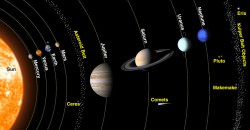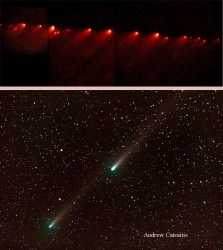Like me, you’re probably a little ego-geocentric about the importance of Earth. It’s where you were born, it’s where you keep all your stuff. It’s even where you’re going to die – I know, I know, not you Elon Musk, you’re going to “retire” on Mars, right after you nuke the snot out of it.
For the rest of us, Earth is the place. But in reality, when it comes to planets, this is somebody else’s racket. This is Jupiter’s Solar System, and we all sleep on its couch.
Jupiter accounts for 75% of the mass of the planets of the Solar System, nearly 318 times more massive than Earth, and isn’t just the name of everyone’s favorite secret princess. It’s the 1.9 × 10^27 kilogram gorilla in the room. Whatever Jupiter wants, Jupiter gets. Jupiter hungry? JUPITER HUNGRY.
What Jupiter apparently wants is to throw our stuff around the Solar System. Thanks to its immense gravity, Jupiter yanks material around in the asteroid belt, preventing the poor space rocks from ever forming up into anything larger than Ceres.
Jupiter gobbles up asteroids, comets, and spacecraft, and hurtles others on wayward trajectories. Who knows how much mayhem and destruction Jupiter has gotten into over the course of its 4.5 billion years in the Solar System.
Some scientists think we owe our existence to Jupiter’s protective gravity. It greedily vacuums up dangerous asteroids and comets in the Solar System.
Other scientists totally disagree and think that Jupiter is a bully, perturbing perfectly safe comets and asteroids into dangerous trajectories and flushing earth’s head in the toilet during recess.
Which is it? Is Jupiter our friend and protector, or evil enemy. We’ve already figured out how to dismantle you Jupiter, don’t make us put our plans into action.
Some of the most dangerous objects in the Solar System are long-period comets. These balls of rock and ice come from the deepest depths of the Oort cloud. Some event nudges these death missiles into trajectories that bring them into the inner Solar System, to shoot past the Sun and maybe, just maybe, smash into a planet and kill 99.99999% of the life on it.

There’s a pretty good chance some of the biggest extinctions in the history of the Earth were caused by impacts by long period comets.
As these comets make their way through the Solar System, they interact with Jupiter’s massive gravity, and get pushed this way and that. As we saw with Comet Shoemaker-Levy, some just get consumed entirely, like a tasty ice-rock sandwich.
The theory goes that Jupiter pushes these dangerous comets out of their murder orbits so they don’t smash into Earth and kill us all.
But a competing theory says that Jupiter actually diverts comets that would have completely missed our planet into deadly, Earth-killing trajectories.
Will the Sailor Scouts provide us any clues? Who can say?

Here’s friend of the show, Dr. Kevin Grazier, a planetary scientist and scientific advisor for many of your favorite sci-fi TV shows and movies.
… [ see video for Interview with Dr. Grazier about Jupiter]
So which is it? Is Jupiter our friend or enemy? We’ll need to run more simulations and figure this out with more accuracy. And until then, it’s probably best if we just tremble in fear and worship Jupiter as a dark and capricious god until the evidence proves otherwise. It’s what Pascal would wager.
What are some other theories you’ve heard about and you’d like us to dig in further? Make some suggestions in the comments below.
Thanks for watching! Click subscribe, never miss an episode.
If you’re into other facts about our Solar system here’s a link to our Solar system playlist. Thanks to Ben Johnson and Tal Ghengis, and the members of the Guide to Space community who keep these shows rolling. Love space science? Want to see episodes before anyone else? Get extras, contests, and shenanigans with Jay, myself and the rest of the team. Get in on the action. Click here.


I’m impressed that in 1959, comet 67/P now visited by Rosetta, had its closest distance from the Sun lowered from 2.7 to 1.3 AU by Jupiter’s gravity. Not billions of years ago. 56 years ago. A 4+ km diameter civilization threatening comet suddenly came a lot closer to us.
I think a close investigation would review Jupiter’s change in position in the solar system over its life. Jupiter is widely believed to have wandered well into the solar system early on and the crawled back out. During each phase it’s relationship to the Earth could have changed. We might very much have needed the influx of comets to make our world as wet as it is AND as the means of how Jupiter got pulled back out of our neighborhood. In comparison from being ejected from the solar system even a couple extinction level events don’t come close to that disaster (though there are a couple articles out there about how life could be sustained on rogue planets wandering the space between stars.)
I’ve never liked that idea, that Jupiter protects us. Based on nothing, I’ll bet Jupiter does more “harm” than “good”.
My reasoning: Most comets & space rocks are on very large orbits, most never coming anywhere near to 1AU from the sun – unless they’re severely perturbed. So since most rocks are in safe orbits, most perturbations, of any kind, are more likely to be “bad”.
Maybe it was different billions of years ago, but probably by now most of the rocks that may have started with sun-grazing orbits were eaten by the sun, or smacked into a planet.
Jupiter might sometimes deflect harmful ones, which are relatively few, but I’d think it would more often disturb a harmless one, since there are so many more (1000 times more? Millions?) of the harmless ones out there.
Perhaps most or nearly all of the dangerous rocks, in this era, can be blamed on Jupiter (and the other planets, of course).
Friend / Foe?? Neither – Nor !
“Jupiter s protecting us by catching the ones that would hit us!” is the same nonsense like “Black Holes are swallowing light!”. Really??? Do they BURP like babies afterwards??? (A Black Hole is bending space and that prevents light from “coming out”! Swallow…. hmpf!
To protect us Big J must be on the right spot…. at the right time. If we know one thing: the space out there is veeery biiiiig, so to be at the right spot at the right time… coincidence! How often did U ran out of gas…….. right in front of a gas station (the cheapest in town, of course!)?